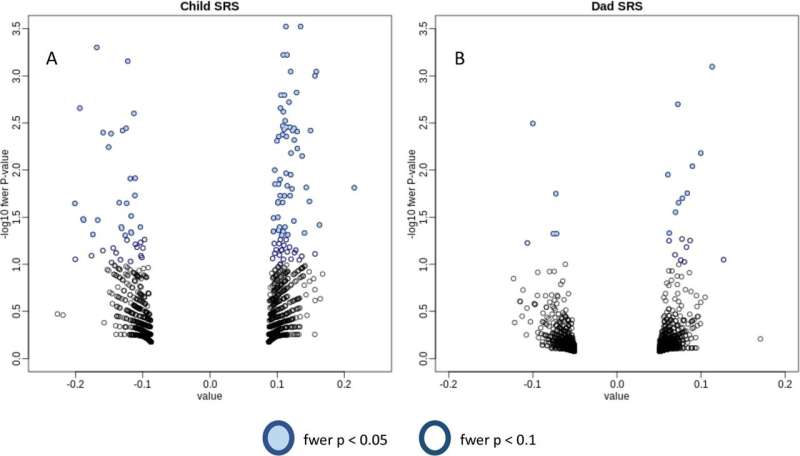This article has been reviewed according to Science X's editorial process and policies. Editors have highlighted the following attributes while ensuring the content's credibility:
fact-checked
peer-reviewed publication
trusted source
proofread
Changes in father's sperm linked to autistic traits in their children, small preliminary study suggests

Among families with children diagnosed with autism spectrum disorder, Johns Hopkins University researchers say they have found a link between chemical "marks" on DNA in the sperm of fathers and autistic traits in their 3-year-old children.
The research, reported April 27 in Molecular Psychiatry, adds to mounting evidence that the so-called epigenome influences the origins of autism spectrum disorder, a suite of developmental conditions that affects the brain and is marked by repetitive behaviors and problems with social communication. Epigenetic changes in DNA don't alter the genetic code itself, but they disturb how the genetic code is "read" and used by the body.
The researchers caution that the study is in a small group of people—45 fathers and 31 children—and the findings may or may not hold up in the general population. But, they say, if further research confirms their work, the epigenetic signs they identified could be potential markers for autism risk, and may help families secure early intervention for children with autistic traits.
"This research could also provide insight on genetic contributions to autism that are potentially being missed by gene sequencing analysis that only looks at direct DNA code," says co-lead investigator Heather Volk, Ph.D., an associate professor of mental health at the Johns Hopkins Bloomberg School of Public Health and director of the Wendy Klag Center for Autism & Developmental Disabilities.
"Changes in the epigenome can be influenced by genes, the environment, or age, and the new research can show us more about how epigenetic changes in parents influence the health of children," says co-lead investigator Andrew Feinberg, M.D., Bloomberg Distinguished Professor at the Johns Hopkins University School of Medicine, Whiting School of Engineering and Bloomberg School of Public Health. Feinberg pioneered studies in the 1980s that identified epigenetic changes that influence cancer development.
For the current study, the researchers focused on a type of epigenetic alteration called DNA methylation, in which certain chemical groups attach to areas of DNA that guide genes' on/off switches. When methylation goes awry, certain genes are abnormally turned on or off, triggering problems in cell behavior.
"Since genetic changes in the DNA itself explain only a small fraction of autism, our study shows that it's time to expand the study of sperm DNA methylation in fathers to see if that can help to identify autism risk and the impacted genes associated with it," says senior research data analyst Jason Feinberg, who along with Rose Schrott, Ph.D., were first authors of the study.
The new Johns Hopkins study made use of data from participants already enrolled in a national study, the Early Autism Risk Longitudinal Investigation, which follows families in the U.S. that have children diagnosed with autism. The researchers used semen samples collected from men in the study around the time their partners were pregnant.
The researchers also collected information from fathers and children such as their scores on the social responsiveness scale (SRS), a standard behavioral assessment for social anxiety used by many clinicians. Higher SRS scores indicate a more likely diagnosis of autism.
Some 80% of the 45 fathers and 31 children included in the current Johns Hopkins study identified as white and non-Hispanic, and all were between 28 and 51.2 years old.
In all the paternal sperm samples, the researchers found 94 regions of differential DNA methylation that were statistically significant in their association with a child's high scores on the SRS scale, indicating a likelihood of autistic traits. None of the fathers had a diagnosis of autism spectrum disorder.
Among the 94 differentially methylated regions, 14 of those regions overlapped with genes that control synapses, or connections between neurons, the development of new neurons in the brain and brain cell maturation. Another 14 regions of differential methylation were found in genes previously linked to autism.
In four areas of differential sperm methylation that showed the most significant correlation with high SRS scores in children, the researchers found between 5.5% and 8% difference in methylation levels among children with the highest and lowest SRS scores. Some 22 of the differentially methylated regions in paternal sperm that were highly associated with high SRS scores in their children were also found to be differentially methylated in postmortem brain tissue of people with autism gathered in separate studies.
The Johns Hopkins researchers say that it's important that their study examined sperm samples taken during pregnancy to ensure they identified methylation levels that likely influenced autistic traits.
The researchers say their results need to be replicated in a larger group of families who have autistic children, as well as the general population.
More information: Jason I. Feinberg et al, Epigenetic changes in sperm are associated with paternal and child quantitative autistic traits in an autism-enriched cohort, Molecular Psychiatry (2023). DOI: 10.1038/s41380-023-02046-7





















